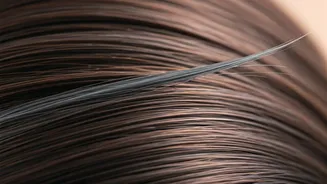Genetics: The Blueprint
Our genes are often the primary instigators behind a myriad of traits, and the color of our hair is certainly not an exception to this. Genetic predisposition
is a crucial factor in determining when we begin to see the first gray strands. Think of it like this: if your parents or grandparents experienced early graying, the chances are higher that you might too. This inherited trait essentially sets a 'timeline' for the pigment-producing cells in your hair follicles, known as melanocytes. These melanocytes produce melanin, which gives your hair its color. When these cells begin to slow down or stop producing melanin, the result is gray or white hair. While genetics certainly plays a significant role, it’s not the only influence, as other factors can accelerate or impact the process.
Stress's Silent Impact
Chronic stress, a pervasive element of modern life, has a significant impact on several physiological processes, including hair pigmentation. High stress levels can disrupt various bodily functions, and this includes potentially impacting the melanocytes responsible for hair color. Though the exact mechanisms aren’t fully understood, sustained periods of stress are believed to contribute to oxidative stress within the body. Oxidative stress can damage cells, which includes those producing melanin. Additionally, stress might trigger or worsen underlying health conditions, some of which are connected to premature graying. It’s important to note that, while stress can accelerate graying in susceptible individuals, it's rarely the sole cause, acting more as a catalyst alongside other contributing factors.
Sun's Double-Edged Sword
The sun, while vital for vitamin D synthesis, also carries a downside, particularly in relation to premature graying of hair. Prolonged and excessive exposure to ultraviolet (UV) radiation from the sun can potentially damage hair follicles, leading to various issues, including pigment changes. UV exposure produces free radicals, unstable molecules that can cause oxidative stress and harm to cells. This damage can include cells that are responsible for melanin production, which subsequently leads to premature graying. Additionally, sun damage can weaken hair strands, making them more susceptible to breakage. Thus, protecting your hair from the sun by wearing hats or using hair products with UV protection becomes an important aspect of hair health.
Nutritional Deficiencies & Hair
Our nutritional intake plays a vital part in the overall health of our bodies, and the hair is no exception. Certain vitamin deficiencies have been linked to early hair graying. For instance, deficiencies in vitamin B12, vitamin D, and iron have been connected to premature graying. Vitamin B12 is essential for red blood cell formation and neurological function, and its deficiency can lead to hair changes. Vitamin D plays a significant role in hair follicle cycling and hair growth. Similarly, iron is crucial for transporting oxygen to cells, including those in hair follicles. If these crucial nutrients are lacking, it can disrupt the normal production of melanin, and therefore influence the onset of gray hair. It’s crucial to maintain a balanced diet with proper nutrient intake to promote optimal hair health.
Autoimmune Conditions' Role
Certain autoimmune conditions have been linked to premature graying, and understanding this connection can provide valuable insights. In autoimmune diseases, the body's immune system mistakenly attacks its own cells. In some cases, this can affect hair follicles and the melanocytes. Conditions such as alopecia areata and vitiligo can directly impact hair pigmentation. Alopecia areata, an autoimmune disorder, can cause hair loss and sometimes affect hair color, potentially leading to graying. Vitiligo causes the loss of pigment in patches of skin, which can also affect the hair follicles, leading to white or gray hair in the affected areas. When the immune system attacks the melanocytes, it disrupts melanin production, resulting in color loss.
Smoking's Harmful Habits
Smoking is known to have a host of detrimental effects on the human body, and these also extend to the health and color of your hair. The chemicals found in cigarette smoke are damaging to various bodily functions, increasing oxidative stress and cellular damage. This in turn can affect melanocytes, leading to premature hair graying. Smoking also impairs blood circulation, which means the blood flow to the hair follicles is reduced. This restriction can impact the delivery of nutrients, making the hair weak and accelerating the graying process. Moreover, smoking can contribute to inflammation in the body, which can exacerbate other factors associated with hair color changes. Consequently, quitting smoking can have numerous health benefits, including potentially slowing down or preventing early graying.
























